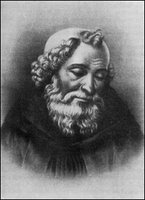Blame the Bad Christians...?
 My good friend, Jon Warner, has a post over on his blog that got me thinking. In it, Jon questions the "labels" we live under as a result of "hero worship" in the Christian faith. He argues that even those "great saints" who have gone before us have had fatal flaws in their character which are significant enough that we should distance ourselves from labelling ourselves with their names.
My good friend, Jon Warner, has a post over on his blog that got me thinking. In it, Jon questions the "labels" we live under as a result of "hero worship" in the Christian faith. He argues that even those "great saints" who have gone before us have had fatal flaws in their character which are significant enough that we should distance ourselves from labelling ourselves with their names.There is a good amount of truth in this. I cringe anytime someone says something like, "oh... you're a Calvinist..." with that look on their face as if to say, "now I've got you all figured out." It is good to fight labels in the sense that we don't want to either follow or be labelled as following a person's teachings carte blanche. If we just accept something because someone we like said it, we're in grave danger of exalting people to places in our minds that they don't deserve.
That being said, I think Jon is reacting against a type of Christianity that I am unfamiliar with. For example, Michael Haykin has posted a wonderful series on Eminent Christians through history on his blog. These posts have been insightful, encouraging, edifying, and challenging. There has been no hint of hagiography; all of the sketches picture great men of the faith who, even while being great, were still men.
 This seems to be symptomatic of much of the angst and rebellion in the "younger evangelicals" these days: There is reaction to what is legitimately wrong, but they are unwilling or unable to see that there are those still within evangelicalism who have not made that particular mistake. As a result, lookout below, because here comes that nasty pendulum.
This seems to be symptomatic of much of the angst and rebellion in the "younger evangelicals" these days: There is reaction to what is legitimately wrong, but they are unwilling or unable to see that there are those still within evangelicalism who have not made that particular mistake. As a result, lookout below, because here comes that nasty pendulum.
It would appear that the solution here is, as with many other problems, merely a matter of reasoning things through. Do we have much to learn from great figures of our faith? Yes. Have people gone too far in the past and made idols out of Christian figures? Yes. Do we need to avoid all labels as a result? No. Are labels sometimes frustrating? Yes, absolutely.
So what do we do? Well, first we actually have to read our Bibles. Believe it or not, the Bible might have a thing or two to teach us about how to view ourselves in the light of those who have gone on before. I wonder if some would even accuse the author of Hebrews of hero worship in Hebrews 11?
 Next, we need to actually read church history... in a discerning manner. Then we ask questions: Were they right? Why? How can we advance / build off of what they said? Hopefully this will lead to a more reasoned approach to progressing Christian thought.
Next, we need to actually read church history... in a discerning manner. Then we ask questions: Were they right? Why? How can we advance / build off of what they said? Hopefully this will lead to a more reasoned approach to progressing Christian thought.
That being said, I think Jon is reacting against a type of Christianity that I am unfamiliar with. For example, Michael Haykin has posted a wonderful series on Eminent Christians through history on his blog. These posts have been insightful, encouraging, edifying, and challenging. There has been no hint of hagiography; all of the sketches picture great men of the faith who, even while being great, were still men.
 This seems to be symptomatic of much of the angst and rebellion in the "younger evangelicals" these days: There is reaction to what is legitimately wrong, but they are unwilling or unable to see that there are those still within evangelicalism who have not made that particular mistake. As a result, lookout below, because here comes that nasty pendulum.
This seems to be symptomatic of much of the angst and rebellion in the "younger evangelicals" these days: There is reaction to what is legitimately wrong, but they are unwilling or unable to see that there are those still within evangelicalism who have not made that particular mistake. As a result, lookout below, because here comes that nasty pendulum.It would appear that the solution here is, as with many other problems, merely a matter of reasoning things through. Do we have much to learn from great figures of our faith? Yes. Have people gone too far in the past and made idols out of Christian figures? Yes. Do we need to avoid all labels as a result? No. Are labels sometimes frustrating? Yes, absolutely.
So what do we do? Well, first we actually have to read our Bibles. Believe it or not, the Bible might have a thing or two to teach us about how to view ourselves in the light of those who have gone on before. I wonder if some would even accuse the author of Hebrews of hero worship in Hebrews 11?
 Next, we need to actually read church history... in a discerning manner. Then we ask questions: Were they right? Why? How can we advance / build off of what they said? Hopefully this will lead to a more reasoned approach to progressing Christian thought.
Next, we need to actually read church history... in a discerning manner. Then we ask questions: Were they right? Why? How can we advance / build off of what they said? Hopefully this will lead to a more reasoned approach to progressing Christian thought..jpg)



1 comment:
I think that labelling is really a situation where we have to be realistic. It's like being a Thomas Reid to a David Hume - we need a little common sense!
We live in a world where the term Christian has deteriorated to include Jehovah's Witnesses and Mormons. These groups are, by definition, not Christian. Not to mention the Roman Catholics, Eastern Orthodox and all the variations in between. Therefore we need to distinguish ourselves as Protestants. Yet, within Protestantism we don't escape confusion with heretics. There's John Spong, John Robinson, John Crossan (the three Johns!) who would find themselves under the banner "Protestant." So then we have to refine our definition and say we're evangelical.
But evangelical has become so wishy washy that it doesn't look like it did even fifty years ago. If we say we're evangelical, does that really help explain in a quick way, what I believe? Because I'm Reformed, I don't believe things that someone like Bill Hybels or Joel Osteen believes, yet we all call ourselves evangelical.
Heck, even to call myself a Calvinist doesn't really help! I'm not a paedobaptist Calvinist. You get the idea (surely).
I think that labels are necessary and helpful. Though they are not the be all and end all of my identity, it does give someone a picture of where my theological presuppositions are coming from.
Guys who have a problem with that will develop a label for themselves one time or another -- even if its defining themselves against what they are not. We can't escape monikers that explain who we are. People need to give up the false-piety of "no labels."
Post a Comment